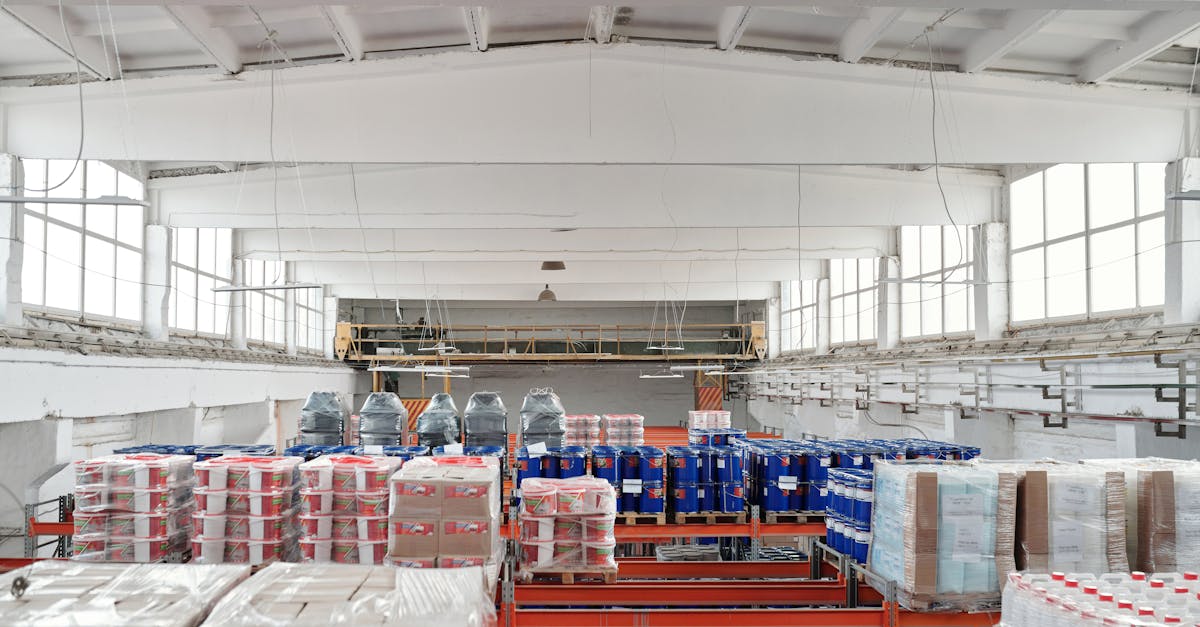Supply Chain Logistics | Optimising Supply Chain Management and Logistics for Enhanced Efficiency
Key Takeaways
- Comprehending the logistics of supply networks
- Essential elements of supply chain administration
- Creating a successful logistics plan
- The significance of learning in logistics
- Advancements in supply chain logistics
- Obstacles in supply chain logistics
Understanding Supply Chain Logistics
Supply chain logistics plays a crucial role in the overarching framework of supply chain management, ensuring that goods move efficiently from one point to another. A supply chain manager must oversee the various logistics services that contribute to the seamless operation of supply chains, relying on effective logistics management to balance cost and service quality. The integration of logistics networks from IMD Fulfilment is vital for optimising operations, particularly in a global supply chain where complexities increase. Supply chain management systems facilitate the coordination and flow of information, enabling supply chain managers to make informed decisions. By effectively utilising these systems, businesses can enhance their logistics functions and improve overall supply chain logistics efficiency.
Defining Supply Chain
A supply chain encompasses a comprehensive network of organisations, suppliers, and logistics that work collaboratively to transform raw materials into finished products. Effective supply chain logistics ensure that each component within this network operates smoothly, leading to enhanced supply chain optimisation. This includes managing suppliers efficiently while also integrating sustainable practices that contribute to supply chain sustainability. The involvement of third-party logistics providers can further streamline operations, allowing businesses to concentrate on their core competencies.
Risk management is a critical aspect of supply chain management (SCM) that focuses on identifying potential disruptions and developing strategies to mitigate them. Factors such as reverse logistics play a crucial role in maintaining customer satisfaction by managing returns effectively. Education in this field, often facilitated by institutions like the Chartered Institute of Logistics and Transport, is vital for developing professionals skilled in supply management and capable of driving innovation within the supply chain network.
The Role of Logistics in Supply Chain Management
Logistics serves as the backbone of supply chain management by ensuring the seamless flow of goods from suppliers to consumers. Supply chain logistics encompasses various activities, including freight transport, inventory management, and freight forwarding. Effective logistical processes are vital for maintaining the delicate balance between supply and demand. Without a robust inventory management system, businesses may struggle to keep up with customer expectations, leading to either excess inventory or stock shortages.
The integration of technology in logistics has dramatically improved operational efficiency. Warehouse management systems facilitate better oversight of inventory levels, while advanced freight transportation methods reduce delivery times and costs. Companies increasingly rely on machinery and automated solutions to enhance productivity across their supply chains. By aligning logistical strategies with overall business objectives, organisations can better navigate the complexities of supply chain logistics and respond adeptly to market changes.
Key Components of Supply Chain Management
Supply chain logistics encompasses the critical processes that link the procurement of raw materials to wholesalers, warehouses, and final retailers. An efficient logistics network is essential for overseeing manufacturing processes, ensuring timely delivery, and maintaining effective inventory control. Inventory optimisation plays a crucial role in balancing supply and demand, minimising excess stock while meeting customer needs. The integration of air freight services enhances the distribution capability, allowing retailers to receive products swiftly and efficiently. With the complexity of modern manufacturing, a seamless connection between all stakeholders—suppliers, manufacturers, warehouses, and retailers—is vital for the overall success of supply chain logistics.
Elements of a Logistics Network
Supply chain logistics encompasses a network of interconnected components that work together to ensure the smooth flow of goods from manufacturer to consumer. This involves various elements such as transportation, warehousing, and inventory management, all of which play crucial roles in operations management. Successful supply chain executives must understand how these components interrelate within the whole supply chain, as an effective supply chain directly impacts the overall efficiency and responsiveness of supply chain operations.
A common supply chain strategy involves optimising each element of the logistics network to enhance performance while minimising costs. Advanced supply chain practices focus on integrating new technologies and processes to streamline operations. By examining the entire supply chain, organisations can identify opportunities for improvement, ensuring that they not only meet customer demands but also build a resilient and adaptable supply chain. Effectively managing these elements is essential for achieving long-term success in today's competitive marketplace.
Integration of Supply Chain Models
Integration of various supply chain models plays a crucial role in enhancing the efficiency of supply chain logistics. A good supply chain relies on a seamless flow of information and resources across all stages of the supply chain process. A strategic supply chain design ensures that all components work harmoniously, reducing logistics challenges and optimising performance. Companies that analyse and leverage supply chain data effectively can make informed decisions to enhance their logistics strategy and create a true supply chain.
The logistics sector is constantly evolving, necessitating a focus on integrating diverse supply chain models. Businesses must consider how each element of their own supply chain interacts with the others to create an overall supply chain that meets customer demands. Those pursuing a supply chain job must understand the importance of this integration to address potential inefficiencies and develop competitive advantages. By tackling logistics challenges head-on, organisations can forge more resilient and effective systems that contribute to long-term success.
Developing an Effective Logistics Strategy
An effective logistics strategy is crucial for optimising supply chain logistics and ensuring seamless operations. Supply chain managers must collaborate with a logistics management firm to design a well-managed supply chain that addresses both efficiency and cost-effectiveness. In the context of retail logistics, understanding the intricacies of logistics operations can significantly reduce supply chain risk and improve overall performance. Supply chain executives should consider pursuing a logistics course to enhance their knowledge of supply chain control and gain insights into the latest trends in retail logistics operations. By focusing on these elements, organisations can build a robust logistics framework that supports their strategic objectives and enhances competitiveness in the market.
Factors to Consider when Choosing Logistics
Choosing the right supply chain logistics is crucial for the success of any business. Logistics managers must evaluate their own logistics network and consider various factors influencing logistics decisions. The need for flexibility is paramount, especially in a landscape riddled with potential supply chain disruptions. Chief supply chain professionals should assess the capabilities of supply chain partners to ensure they can effectively manage multiple supply chains, whether they follow traditional supply chain models or more modern approaches.
Another significant factor involves understanding the logistics challenge posed by global logistics operations. Distribution or supply chain managers need to be well-informed about the technological advancements and industry trends that could impact their logistics strategy. A robust logistics strategy not only enhances operational efficiency but also empowers supply chain professionals to respond agilely to changes in market demand and potential logistical hurdles. Each decision made must align with the overarching goal of creating a resilient and efficient supply chain logistics framework.
Building Your Own Supply Chain
Creating a robust supply chain logistics framework starts with a deep understanding of logistics-specific work. Effective logistics planning is essential to ensure that logistics activities are streamlined and contribute positively to the overall operational efficiency. Developing an efficient logistics network requires careful allocation of resources and clear communication among logistics teams. By incorporating the expertise of supply chain analysts, businesses can identify potential bottlenecks and implement solutions that facilitate smooth operations.
Establishing dynamic supply chains necessitates a strong foundation of well-managed logistics. Engaging logistics operatives who are trained in introductory supply chain concepts can greatly enhance the flow of goods and information. A focus on sustainable supply chain practices also plays a crucial role in minimising environmental impact while maintaining efficient logistics. By prioritising these elements, organisations can build a resilient supply chain that adapts to the changing market demands.
The Importance of Education in Logistics
Education plays a critical role in shaping the competencies of professionals in supply chain logistics. A strong foundation in both traditional logistics and modern practices, such as supply chain analytics, prepares individuals to navigate complex systems effectively. Many educational institutions offer a two-year logistics programme that covers vital aspects including inbound logistics and outbound logistics. Such training equips graduates to handle the intricacies of international supply chains and the growing demand for logistics consultancies. Understanding the dynamics of extended supply chains ensures that practitioners can optimise processes, making them invaluable assets for companies seeking efficient pls logistics services. Resources like an inbound logistics article provide additional insights that can enhance one's grasp of the industry's challenges and opportunities.
- Importance of logistics education in career advancement
- Development of critical thinking and problem-solving skills
- Exposure to the latest technology and trends in logistics
- Enhancing communication and teamwork abilities
- Understanding regulatory and compliance issues in logistics
- Networking opportunities with industry professionals
- Preparation for certifications and further qualifications in logistics
Overview of a Logistics Degree
A degree in logistics equips students with essential knowledge and skills in supply chain logistics and chain management. Programmes often include topics such as transportation logistics, supply chain visibility, and the intricacies of managing an all-encompassing supply chain. Students learn about the ethical considerations of supply chain operations, preparing them for roles that demand high standards of supply chain ethics. Such a foundational understanding is crucial for those aspiring to become logistics operation leaders or supervisors in various industries.
Many educational institutions offer specialised courses alongside hands-on experiences, such as logistics operations apprenticeships and supply chain apprenticeships. These practical training opportunities provide invaluable insights into real-world supply chain dynamics, enhancing the marketability of graduates. Opportunities abound within the field, including positions that align with innovative companies like IBM, which emphasises the need for skilled supply chain talent to drive advancements in end-to-end supply chain management.
Career Opportunities in Supply Chain Management
A multitude of career opportunities exists within the realm of supply chain logistics. Positions range from logistics coordinators to supply chain analysts, each pivotal in managing chain management activities. Those with a BSc in Logistics or an MSc in Logistics are well-positioned to excel in roles that focus on optimising the supply network. Professionals often engage in supplier/partner relationship management, ensuring seamless collaboration with multiple suppliers to maintain efficient distribution and supply practices.
The ever-evolving landscape of supply chain logistics also opens doors to innovative roles focused on technological advancements. Careers in digital freight and automated logistical activities are increasingly in demand, addressing concerns such as supply shortages and enhancing the effectiveness of supply chains. Opportunities abound for individuals skilled in managing complex logistics systems and understanding the nuances of operational strategies within a diverse supply chain.
Innovations in Supply Chain Logistics
The evolution of supply chain logistics is significantly shaped by technological advancements that enhance operational efficiency. The fast chain model optimises inventory processes, allowing inventory planners to implement efficient inventory management practices. A chain management certificate can provide the necessary knowledge for professionals to navigate these innovations effectively. By focusing on strategic procurement and designing specific chains to meet unique industry demands, companies can minimise excess inventory while maximising responsiveness. Enhanced industry connections further streamline the integration of innovative solutions, ensuring supply chain logistics remain agile and competitive in an ever-changing marketplace.
Technologies Transforming Logistical Operations
The landscape of supply chain logistics is undergoing significant transformation due to advancements in technology. Innovations such as automated warehousing and smart inventory management are shaping the logistics industry. These technologies enhance shipping procedures and streamline the procurement strategy, enabling distributors to respond more effectively to manufacturing demands. As companies adopt these tools, they mitigate procurement risks while improving production planning and efficiency across the entire supply network.
Emerging industry trends are pushing for greater integration of technologies such as artificial intelligence and data analytics. These tools offer insights that can optimise warehouse design and enhance international procurement management practices. With the rise of motor freight and other shipping methods, the ability to adapt logistics operations to meet evolving consumer expectations becomes essential. As the manufacturing sector continues to adapt, embracing these technological advancements will be crucial for maintaining a competitive edge in supply chain logistics.
Future Trends in Supply Chain Management
Anticipating customer demand is becoming increasingly vital in the realm of supply chain logistics. Retail organisations are transitioning towards advanced demand planning methods that utilise real-time data analytics. This shift enables companies to refine their inventory management and avoid issues such as inventory oversupply. By improving the efficiency of the delivery process, businesses can optimise their production management to ensure they are consistently able to deliver products that meet consumer expectations.
The rise of automation is transforming how procurement specialists approach their roles. Manual inventory tracking is being replaced by sophisticated technology that offers seamless integration of logistics operations. As companies seek to streamline deliveries and enhance the overall supply chain logistics framework, it is essential that they invest in innovations that support these advancements. This proactive approach not only improves efficiency but also fosters a competitive edge in the market.
Challenges in Supply Chain Logistics
Navigating the complexities of supply chain logistics presents several challenges that can significantly impact business operations. Fluctuating inventory levels can hinder the ability of warehouse managers to maintain a productive warehouse, often leading to delays in perfect order deliveries. Variations in manufacturing schedules and inconsistent procurement skills can also disrupt major business processes, straining industry partnerships and requiring companies to invest more business resources to compensate. The fast-paced nature of the industry demands professionals with substantial industrial experience to address these hurdles effectively. As supply chain logistics continues to evolve, staying ahead of these challenges is crucial for maintaining operational efficiency and competitiveness.
- Companies must manage fluctuating demand to avoid excess or insufficient inventory.
- Effective communication among stakeholders is essential to synchronise schedules and expectations.
- Adopting advanced technology can help improve visibility and tracking throughout the supply chain.
- Developing strong relationships with suppliers is crucial to ensure reliability and flexibility.
- Continuous training and development for staff can enhance problem-solving capabilities within the logistics team.
- Regularly reviewing and optimising logistics processes can aid in identifying inefficiencies.
- Sustainability considerations are increasingly important and can pose additional challenges in supply chain management.
Conclusion
Understanding supply chain logistics is essential for industries aiming to optimise their operations. Effective management of this aspect cuts shipping expenses significantly while addressing demand problems that frequently arise. Industry experts emphasise the importance of timely deliveries, which directly impacts customer satisfaction and retention. Sales engineers play a crucial role in aligning logistics with manufacturing specifications, helping organisations manage sales effectively. The ability to integrate supply chain logistics with overall business strategies leads to enhanced efficiency and competitiveness across various sectors.
FAQS
How do I choose logistics for effective supply chain optimization and risk management?
To choose logistics effectively, it is important to consider various factors such as supply chain optimization, supply chain risk management, and how third party logistics can enhance your operations. Additionally, utilizing advanced inventory management systems and focusing on inventory optimization can lead to more efficient chain logistics. Understanding that chain logistics refers to the entire process, from procurement to the final delivery, is crucial for logistics operation leaders and supervisors. Organisations often seek guidance from chain logistics executives to evaluate designs that are specific to their industry, ensuring that every shipment contributes to the overall goal of delivering products efficiently.
What are the key roles of logistics operation leaders in managing the complexities of a supply chain?
Logistics operation leaders play a crucial role in ensuring that the supply chain doesn’t face interruptions. They oversee the distribution/supply chain manager, coordinating between various elements of logistics operations. Their effectiveness can greatly influence the design of supply chains specific to an industry, optimising processes and contributing to the success of companies like IBM in the supply chain sector. Educational pathways such as an MSc in logistics or a BSc in logistics can further equip these leaders with the necessary skills to excel in their roles.
How can logistics operation leaders effectively design supply chains for specific industries?
Logistics operation leaders play a critical role in the design of supply chains across specific industries. Their expertise in msc logistics and bsc logistics enables them to tailor the logistics processes to meet the unique demands of the industry. By understanding the intricacies of different supply chains, these leaders can optimise operations, ensuring that the logistics functions align with the overall ibm supply chain strategies and meet the necessary performance metrics.
How do logistics operation leaders ensure effective chains design tailored to specific industry needs?
Logistics operation leaders are crucial in the design of supply chains tailored to specific industry requirements. They analyse industry trends, regulatory demands, and customer expectations to optimise the supply chain structure. By leveraging their expertise, logistics operation leaders implement strategies that address the unique challenges faced by each specific industry, ensuring efficiency and responsiveness in logistics operations.
How can logistics operation leaders/supervisors adapt their strategies to enhance the overall efficiency of the supply chain and improve chains design?
Logistics operation leaders/supervisors play a crucial role in optimising the text supply chain by employing innovative strategies to enhance efficiency. By focusing on data analysis and collaboration, they can effectively adjust the chains design to meet changing demands and overcome logistical challenges. This proactive approach is essential for achieving streamlined operations within the supply chain.





















































































































































